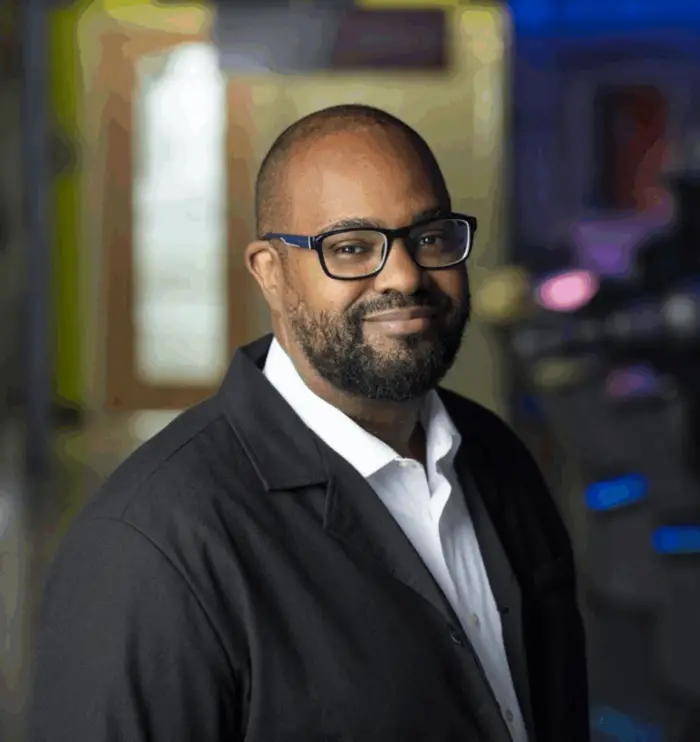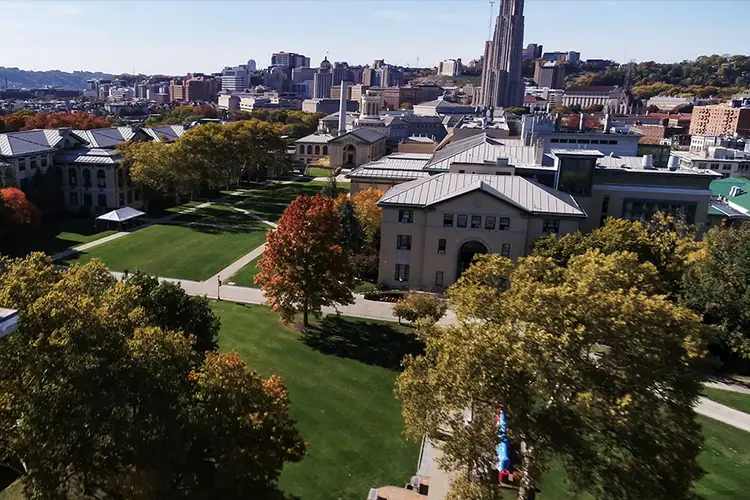
Pittsburgh Deploys the Future of AI
Media Inquiries
Carnegie Mellon University — the birthplace of AI — unites research and education, to develop AI strategies that focus on pioneering safe AI technologies, integrating human-centered design in autonomous systems, and harnessing AI's potential for societal good.
Carnegie Mellon leaders and faculty joined AI innovators, researchers and industry experts at the 2025 AI Horizons event at Bakery Square in Pittsburgh, Pennsylvania. The event focused on how to move AI from concept to real-world impact in critical fields like health care, manufacturing, defense, finance, robotics and more.
Opening Keynote
AI Horizon’s opening keynote, titled “Igniting the AI Deployment Era,” included contributions from Joanna Doven, AI Strike Team executive director and Carnegie Mellon alumna; Zico Kolter, head of CMU’s Machine Learning Department(opens in new window); and Devlin Robinson, a state senator in Pennsylvania.
"We're telling a story here," Doven said during the day’s introduction. "Pittsburgh is now the nation's most concentrated AI hub outside of Silicon Valley."
Kolter then took the stage to speak about the new age of rapid development and deployment of AI, and how research turns into real world impact. He used examples of CMU-based research, such as the autonomous vehicle designs that came from the DARPA Urban Challenge in 2007 and how the same team went on to develop Waymo.
"This is not the future. It's happening right now," he said.
Kolter then joined Andrew Moore, Lovelace CEO and former dean of CMU’s School of Computer Science(opens in new window), and Alison Snyder, a senior writer for Google DeepMind, for a fireside panel on the deployment of AI tools across society.
Art and AI Intersect: “The Endless Mile”
Carnegie Mellon University's College of Fine Arts(opens in new window) also had an established presence at AI Horizons.
CFA faculty members Johannes DeYoung(opens in new window) and Annie Hui-Hsin Hsieh(opens in new window) showcased their multimedia art project, “The Endless Mile(opens in new window),” an experimental animation which was projected onto a wall to respond to audio input of a musical composition by Hsieh. The stated goal of the piece is to complement the day's themes of exploring human-centered approaches to artificial intelligence. The project was previously shown at the LUMA Festival in Binghamton, New York.
Public-Private Powerhouse: Owning Pennsylvania’s AI Moment
Thursday’s final event focused on Pennsylvania’s role as a leader in AI deployment and the state’s role as a key energy source for future data centers. It featured a conversation between Pennsylvania Gov. Josh Shapiro, BNY CEO Robin Vince and Westinghouse Interim CEO Dan Sumner, and moderated by CMU President Farnam Jahanian.
The panel unpacked the role of AI in government efficiency, its impacts on regional workforces and the importance of public-private partnerships working in tandem with higher education to further innovation.
AI’s Future is Physical
The second day of AI Horizons kicked off with a presentation by Martial Hebert(opens in new window), dean of Carnegie Mellon's School of Computer Science, on the history of robotics and computer vision, followed by a conversation with Skild AI co-founders and CMU faculty Abhinav Gupta(opens in new window) and Deepak Pathak(opens in new window) to discuss how AI is making its way into the physical world with robotics and mobility systems.
“We tend to lose track of the fact that the advances that we seek, and the unicorns (startups with valuations of over $1 billion) are the results of very long-term research and very long-term projects,” Hebert said. “Skild AI is the shining example of that, the culmination of that history.”
Pathak shared Skild AI’s efforts to develop a general-use brain for humanoid robots.
“This model works on any robot, any task, one brain,” Pathak said.
He presented videos of robots putting dishes away, walking up steep hills, and walking up and down stairs holding boxes. "We can also do fun stuff," he said, showing a video of a robot performing a front flip over a low obstacle.
Gupta said Skild AI’s work reflects what Pittsburgh offers to AI innovation and deployment.
“In Pittsburgh, we don’t just make fancy stuff, we make things that work,” he said. “I feel Pittsburgh brings a huge amount of dense talent — especially CMU — into one place. We have people doing robotics, we have people doing machine learning. It makes you think much bigger. This is tangible.”
Discovery to Defense: AI and Biomanufacturing at the Frontline
As biotechnology converges with AI, researchers can accelerate the pace of discovery and create lifesaving therapies, such as precise medical treatments that can be tailored to specific individuals.
Barbara Shinn-Cunningham(opens in new window), the Glen de Vries Dean of CMU’s Mellon College of Science, discussed these advances in a conversation alongside ElevateBio Chief Technology Officer Michael Paglia, BioForge Vice President of Engineering Brennan Sellner, National Security Commission on Emerging Biotechnology Senior Policy Adviser Steven Moss, and Pittsburgh Life Sciences Alliance President and CEO Megan Shaw.
“We’re generating so much data that we can’t analyze it by hand the way we used to,” said Shinn-Cunningham. “AI is being used in all sorts of ways. We’re using AI in chemistry to find good molecules that are good candidates for drugs. It’s used in every kind of science.”
Health Care Reimagined: Addressing Data Challenges with AI
Later Friday morning, Chenyan Xiong(opens in new window), an associate professor in the Language Technologies Institute, joined several health care technology and business experts to provide a technical perspective on challenges and opportunities for AI in the health industry.
Xiong spoke alongside Reuben Daniel, president of AI at UPMC Health Plan, Deepan Kamaraj, director of analytics and informatics at UPMC Enterprises, and Avi Goldberg, a partner of GreatPoint Venture. The discussion covered a wide range of topics, from the possible challenges and benefits of regulation to the potential of AI to bolster effectiveness in drug discovery, telehealth and patient care.
“There are a bunch of unique challenges,” Xiong said during the discussion. “A lot of AI research on health is unfortunately constrained or driven by data.”
Among the use cases of AI, Xiong noted, is its potential to utilize all of the structured information created throughout the medical process as doctors work with patients. “It can make the process of putting all of the data together less painful,” he said.
Powering America’s Future: AI and Energy Storage for National Resilience
AI requires an enormous amount of energy and its rapidly increasing demands are straining the country’s aging power grid(opens in new window).
To understand the energy challenges AI has created and how energy storage can offer solutions, CMU Vice President for Research Theresa Mayer(opens in new window) talked with EOS Energy Enterprises CEO Joe Mastrangelo and Engie North America Chief Renewables Officer and Senior Vice President Dave Carroll.
“As a country, we’re moving forward looking for ways to harvest abundant cost effective clean and resilient energy — that’s key,” Mayer said. “We need to make sure that we’re not driving up the cost for consumers. Not only do we need energy to power AI and manufacturing, we can also leverage AI as being very key to achieving these goals. We’ve heard over and over again, this is urgent. Our nation’s prosperity and national security depends on us winning the AI and energy race.”
Mastrangelo and Carroll both emphasized that while artificial intelligence demands considerable amounts of energy, AI is also needed to improve the energy grid.
“We now have computers that can analyze a huge amount of data at once and operate the energy grid much faster than humans,” Carroll said.
Entertainment Technology Takes Center Stage
Faculty and staff from CMU’s Entertainment Technology Center(opens in new window) (ETC), which is celebrating its 25th anniversary, demonstrated during AI Horizons how artificial intelligence is changing the world of interactive media.
Attendees visiting the ETC booth were able to interface with AI directly by picking thematic and stylistic prompts to instantly generate and play a pinball game.
John Balash(opens in new window), director of academic outreach, extension, and engagement at the ETC, encouraged passersby to use the system and gain hands-on familiarity with technology, and talked about the importance of embracing AI. Balash was joined by two ETC staff members on the unit’s outreach and engagement team, narrative designer Paige Branagan and mechanical engineer Chansocphentra Salcido(opens in new window), who both helped create the game.
"At AI Horizons, there are fascinating technologies, fascinating companies, fascinating problems and challenges. But we also have to consider the human component of it,” Balash said. “How do we leverage these technologies to become more human?"
On Friday afternoon, ETC Director Derek Ham(opens in new window) helped to answer this question by taking the stage for a breakout discussion with Karl Blischke, executive director of the PA Council on the Arts, and Jake Marsico, chief creative officer for creative technology company Deeplocal.
During the discussion, Ham talked about the importance of culture and the role it plays in creativity, and how that fits into discussions of AI’s role as a supplement to, rather than a replacement for, human creativity. Near the end of the session, Ham specifically addressed concerns around AI’s use in academic settings, and how educational institutions can still thrive by centering creativity and collaboration as a key factor in student success.
"There are several things that you can do by yourself, but it's that context of teamwork, and that's still how industry is run. That's still how we make products. That's still how companies are formed: in collaboration with other humans," Ham said. "That's the value of a graduate program right now."
Carnegie Mellon leaders and faculty shared their expertise amongst fellow researchers and industry experts at AI Horizons 2025. Recap ➡️ cmu.is/AI-Horizons
[image or embed]— Carnegie Mellon University (@cmu.edu) September 12, 2025 at 10:11 AM
Physical AI Fuels the Machines of Tomorrow
Carnegie Mellon University has long been at the forefront of robotics and autonomy. Now, as artificial intelligence increasingly moves into the physical world, the university is shaping what that future will look like.
Ahead of the AI Horizons Summit(opens in new window), Martial Hebert(opens in new window), dean of the School of Computer Science and a speaker at the conference, shared his perspective on physical AI — what it is, why it matters now and how it’s set to transform industries and create new opportunities.
AI’s Role in the Future of Discovery
Carnegie Mellon is helping define how artificial intelligence reshapes science — from accelerating discovery to scaling up new technologies.
Barbara Shinn-Cunningham(opens in new window), Glen de Vries Dean of the Mellon College of Science and a panelist at the AI Horizons Summit, shared her perspective on AI’s role in responsible biomanufacturing and automated science.
“We are in the midst of a sweeping societal and economic transformation, driven by unprecedented advances in technology. The growing power of artificial intelligence is perhaps the most important intellectual development of our time, with profound impacts on every sector of our economy as well as broad implications for our labor market, workforce and way of life. Our region has a vibrant constellation of research universities, national labs, and companies that can fuel the global race for AI talent and innovation and decisively secure the nation’s advantage in AI.”
— Farnam Jahanian(opens in new window) (president, Carnegie Mellon University)
"AI is revolutionizing science. At Carnegie Mellon, our researchers are harnessing advances in AI and automation and connecting these breakthrough technologies across virtual and physical worlds. These capabilities are reshaping how we discover, design and deploy new technologies, and are central to sustaining U.S. global leadership. By pushing the boundaries of what AI-enabled systems can do, we are creating transformative opportunities for science and industry and strengthening our nation’s capacity to lead in the decades ahead."
— Theresa Mayer(opens in new window) (vice president for research)
Pittsburgh is at the center of the AI revolution — and we’re excited to help power it. #AIHorizons2025 features many Carnegie Mellon experts who are at the forefront of AI innovation and deployment.
[image or embed]— Carnegie Mellon University (@cmu.edu) September 10, 2025 at 3:15 PM
"AI is transforming the world, and reshaping industries across education, software development, healthcare, manufacturing, and beyond. In Pittsburgh, we are helping to build this transformation, taking the fundamental research happening at places like Carnegie Mellon, and bringing it to the world through our startups and our alumni."
— Zico Kolter, professor and director of the Machine Learning Department with the School of Computer Science
“Foundation models have demonstrated strong capabilities in learning medical knowledge from health care data and assisting providers in patient care. Examples include modeling risk in emergency departments, identifying rare diseases in medical images, and predicting cancer risks from longitudinal health care records. These findings highlight a compelling opportunity to transform health care and improve patient outcomes with AI. To realize this potential, we must develop effective and trustworthy health care foundation models, overcome data silos across health care settings, and ensure efficient, ethical governance of data and technology use in health care.”
— Chenyan Xiong, associate professor, Language Technologies Institute, School of Computer Science
“Game designers have long used the term, ‘playing within the Magic Circle,’ to describe the experiences they create as being special realms. These fictional realities temporarily suspend real-world rules, allowing players to escape within playful entertainment. However, what if these rules were not human-authored? What if these fictional realities- – the ‘Magic Circle’ — were shared with nonhuman players? At the ETC we are exploring the new frontiers A.I. is helping to shape in gaming, virtual reality (XR) and in-person entertainment."
— Derek Ham director, Entertainment Technology Center




















